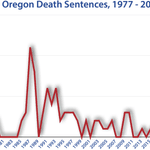
State & Federal
Oregon

History of the Death Penalty
The death penalty was first adopted in Oregon in 1864. Hangings were carried out publicly until 1903, when the Oregon Legislature amended the law and moved executions to the Oregon State Penitentiary.
Timeline
1864 — Capital punishment is first adopted in Oregon.
1903 — The Oregon Legislature amends state law to move executions out of the public and into the Oregon State Penitentiary.
1904 — H.D. Egbert is hanged at the Oregon State Penitentiary, becoming the first man to be executed under the law.
1914 — Oregon abolishes the death penalty by a popular vote.
1920 — Oregon voters reinstate the death penalty.
1939 — LeRoy Hershel McCarthy becomes the first man to be executed in Oregon’s gas chamber. 17 men are executed by lethal gas following Mr. McCathy’ execution.
1964 — The last execution in Oregon takes place when 17-year-old John Anthony Soto, the youngest person in Oregon’s death row history, is executed.
1964 — Oregon voters repeal capital punishment for the second time.
1978 — The death penalty is reinstated by popular vote for the second time.
1981 — The Oregon Supreme Court declares the death penalty unconstitutional.
1984 — Oregon voters reinstate capital punishment despite the Supreme Court’s previous repeal.
1996 — Douglas Franklin Wright becomes the first person executed by lethal injection in Oregon.
2011 — Two death row prisoners’ sentences are vacated due to concerns regarding their mental competency.
2011- Governor John Kitzhaber declares a moratorium on executions.
2013 — The Oregon Supreme Court rules that Governor Kitzhaber may continue his moratorium on executions during his term in office.
2015 — Governor Kate Brown announced that she ill uphold Governor Kitzhaber’s moratorium throughout her incumbency.
2019 — A bill passes the state senate stipulating that prosecutors may only pursue the death penalty for acts of terrorism in which at least two people are killed, the murder of a child younger than age 14, and murder committed in prison by a person already incarcerated for a previous murder conviction. The bill also eliminates speculation about a defendant’s future dangerousness from a jury’s capital sentencing deliberations.
2020 — Oregon closes its death row and integrates most of its death row prisoners into the general prison population.
2022 — Governor Kate Brown grants clemency to all 17 people on Oregon’s death row. Their sentences are commuted to life without the possibilityy of parole.
Milestones in Abolition/Reinstatement
Oregon abolished the death penalty in 1914 via popular vote. It was reinstated again in 1920, also by popular vote. In 1964, Oregon voters once again voted to repeal the death penalty. On Nov. 5, 1964, two days after Oregon voters abolished the death penalty for the second time, then-Gov. Mark O. Hatfield commuted the death sentences of the three inmates on death row, including the only woman ever to be sentenced to death in Oregon.
The death penalty was reinstated by popular vote in 1978.
In 1981, the Oregon Supreme Court declared the death penalty unconstitutional, but Oregon voters reinstated capital punishment in 1984.
On November 22, 2011, Governor John Kitzhaber declared a moratorium on executions, saying “I refuse to be a part of this compromised and inequitable system any longer; and I will not allow further executions while I am Governor.” Both of Oregon’s post-Furman executions happened during Kitzhaber’s first administration as governor. Both inmates dropped their appeals and “volunteered” for execution. Of those two executions, Kitzhaber said, “I was torn between my personal convictions about the morality of capital punishment and my oath to uphold the Oregon constitution. They were the most agonizing and difficult decisions I have made as Governor and I have revisited and questioned them over and over again during the past 14 years.”
Saying “[t]here needs to be a broader discussion about fixing the system,” Governor Kate Brown announced on February 18, 2015, that she would continue the state’s moratorium on executions. Brown said “[u]ntil that discussion, I will be upholding the moratorium imposed by Gov. Kitzhaber.”
On December 13, 2022, Governor Kate Brown announced that she would grant clemency to all 17 people on Oregon’s death row. Their sentences were commuted to life without parole.
Other Interesting Facts
Oregon executed two brothers (George and Charles Humphery) on the same day in 1913.

Resources

Oregon Execution Totals Since 1976
News & Developments
News
Jun 04, 2025
2025 Roundup of Death Penalty Related Legislation
More than one hundred bills have been introduced this year in 34 states and in Congress to expand and limit use of the death penalty, abolish and reinstate the death penalty, modify execution protocols and secret the information about them, and alter aspects of capital trials. Thus far, nine bills in five states have been enacted, with Florida enacting the most legislation. Of the bills that have been signed into law, three modify execution protocols; two expand…
Read MoreNews
Sep 08, 2023
Former Oregon Death Row Prisoner Freed 2 Years After Reversed Conviction, 194th Death Row Exoneration
On September 5, 2023, Jesse Johnson (pictured) was released from Marion County Jail in Oregon when prosecutors formally declined to retry him for the 1998 murder of Harriet Thompson. Mr. Johnson was convicted of Ms. Thompson’s murder in 2004 and sentenced to death. In asking the Marion County Circuit Court to dismiss the case against Mr. Johnson, the county District Attorney’s office stated that“based upon the amount of time that has passed and the unavailability of…
Read MoreNews
Feb 21, 2023
NEW PODCAST: Former Prison Superintendent Frank Thompson on How Executions Affect Corrections Officers
In the February 2023 edition of Discussions with DPIC, former Oregon Superintendent of Prisons Frank Thompson speaks with DPIC Managing Director Anne Holsinger about how his experiences as a corrections officer — as well as being a murder victim’s family member — have affected his views on capital punishment. Thompson oversaw the only two executions performed in Oregon in the past 50 years and was responsible for developing the execution protocol. He said…
Read MoreNews
Dec 14, 2022
Gov. Kate Brown Commutes the Sentences of Oregon’s 17 Death-Row Prisoners
Calling the death penalty“both dysfunctional and immoral,” Oregon Governor Kate Brown (pictured) has commuted the death sentences of the 17 prisoners on the state’s death row. The commutations, which the governor announced on December 13, 2022, went into effect December 14 and resentenced the prisoners to life…
Read MoreNews
Dec 06, 2022
Midterm Elections: Moratorium Supporters, Reform Prosecutors Post Gains Despite Massive Campaign Efforts to Tie Reformers to Surge in Violent Crime
In a year that featured massive campaign advertising attempting to portray legal reformers as responsible for increases in violent crime, candidates committed to criminal legal reform or who promised to continue statewide moratoria on executions posted key election wins in the 2022 midterm elections. Defying a pre-election narrative forecasting a backlash against progressive prosecutors and conventional wisdom that fear of crime drives political…
Read More


